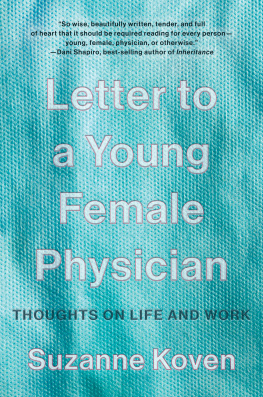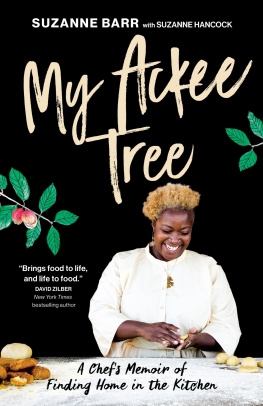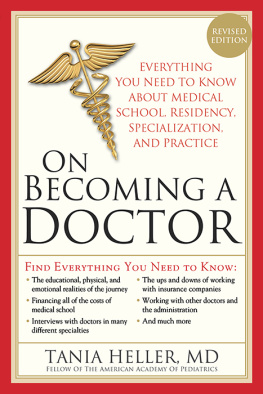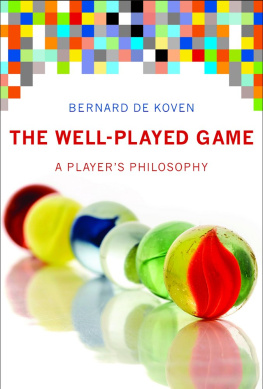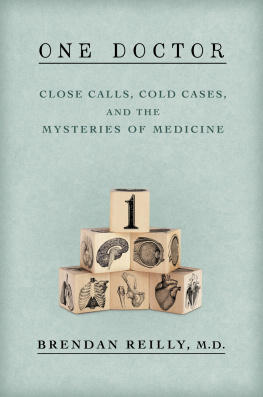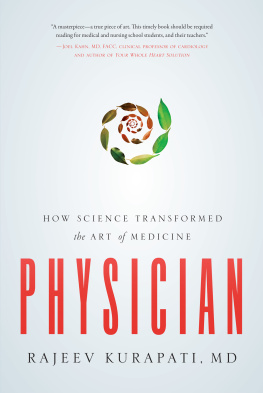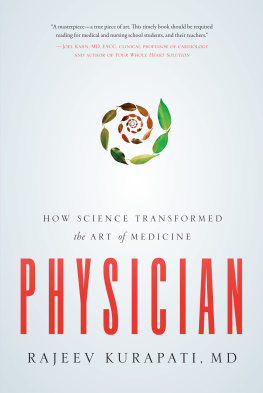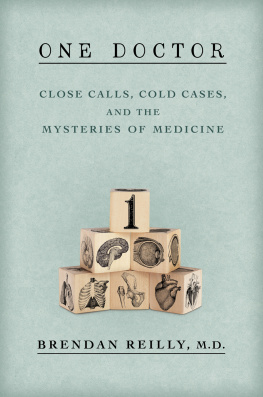Contents
Guide

L ETTER
TO A
Y OUNG F EMALE
P HYSICIAN
Notes from a Medical Life

Suzanne Koven

For Carlo, who knew all along
Look wise, say nothing, and grunt.
Speech was given to conceal thought.
SIR WILLIAM OSLER
Tell me everything.
MY MOTHER
CONTENTS
In these pages I have changed the names of my patients, colleagues, family members, and friends and altered potentially identifying details about them. I have also reconstructed scenes and dialogue and conflated certain events and people.
L ETTER
TO A
Y OUNG F EMALE
P HYSICIAN
_________
May 18, 2017
T his past June, I participated in an orientation session during which new interns were asked to write self-addressed letters expressing their hopes and anxieties. The sealed envelopes were collected and then returned six months later, when Im sure the interns felt encouraged to see how far theyd come. This exercise, in which the intern serves as both letter writer and recipient, both novice and veteran, offers a new twist on an old tradition. In 1855, James Jackson published Letters to a Young Physician Just Entering Upon Practice . More recent additions to this epistolary canon include Richard Selzers Letters to a Young Doctor, which appeared in 1982, and Treatment Kind and Fair: Letters to a Young Doctor, which Perri Klass published in 2007 on the occasion of her sons entry into medical school.
When I started my internship thirty years ago, I wasnt invited to share my hopes and anxieties in a letteror anywhere else, for that matter. In fact, I recall no orientation at all, other than lining up to receive a stack of ill-fitting white uniforms, a tuberculin skin test, and a hasty and not particularly reassuring review of CPR. Perhaps the memory of my own abrupt initiation explains my response as I sat at the conference table watching the new interns hunched earnestly over their letters: I was filled with longing. I wanted so much to tell them, particularly the womenmore than half the group, I was pleased to notewhat I wished Id known. Even more, I yearned to tell my younger self what I wished Id known. As the interns wrote, I composed a letter of my own.
Dear Young Female Physician:
I know you are excited and also apprehensive. These feelings are not unwarranted. The hours you will work, the body of knowledge you must master, and the responsibility you will bear for peoples lives and well-being are daunting. Id be worried if you werent at least a little worried.
As a woman, you face an additional set of challenges, but you know that already. On your urology rotation in medical school, you were informed that your presence was pointless, since, as you were told by an attending, no self-respecting man would go to a lady urologist. There will be more sexism, some infuriating, some merely annoying. As a pregnant resident, you inquired about your hospitals maternity-leave policy for house officers and was told that it was a great idea and you should draft one. Decades into practice, when you call in a prescription, some pharmacists still ask for the name of the doctor you are calling for.
And there will be more serious and damaging discrimination as well. It pains me to tell you that, as Im nearing the end of my career, female physicians annually earn on average $20,000 less than our male counterparts (even allowing for factors such as numbers of publications and hours worked); are less likely than men to receive academic promotions; are still underrepresented in leadership positions, even in specialties such as OBGYN in which we are a majority; and are subjected to sexual harassment ranging from unwelcome bro humor in operating rooms and on hospital rounds to abuse so severe it causes some women to leave medicine altogether.
And theres another, more insidious, obstacle that youll have to contend withone that resides in your own head. At least, that has been the case for me. You see, Ive been haunted at every step of my career by the fear that I am a fraud. This fear, sometimes called imposter syndrome, is not unique to women. Your male colleagues also have many moments of insecurity, when theyre convinced that they alone among their peers are incapable of understanding the coagulation pathway, tying the perfect surgical knot, or detecting a subtle heart murmur.
I believe that womens fear of fraudulence is similar to mens, but with an added feature: not only do we tend to perseverate over our inadequacies, we also often denigrate our strengths. While women like mewhite, cisgendered, without disabilities, from privileged backgroundscommonly experience these feelings of self-doubt, they are even more common and intense for women of color, members of the LGBTQ community, women with disabilities, and first-generation college graduates from poor and working-class families who may arrive at medical school having internalized the prejudices that have been directed at them all their lives.
A 2016 study suggested that patients of female physicians have superior outcomes. The publication of that finding prompted much speculation about why it might be so: perhaps women are more intuitive, more empathic, more attentive to detail, better listeners, or even kinder? I dont know whether any of those generalizations are true, but my personal experience and observations make me sure of this: when women do possess these positive traits, we tend to discount their significance and may even consider them liabilities. We assume that anyone can be a good listener, be empathicthat these abilities are nothing special and are the least of what we have to offer our patients.
I have wasted much time and energy in my career looking for reassurance that I was not a fraud and, specifically, that I had more to offer my patients than the qualities they seemed to value most.
Early on, I believed that displaying medical knowledgethe more obscure the betterwould make me worthy. That belief was a useful spur to learning, but ultimately provided only superficial comfort. During my first-year clinical-skills course, an oncologist asked me to identify a rash. Mycosis fungoides! I blurted out, since it was one of the few rashes whose name I knew and the only one associated with cancer. My answer turned out to be correct, causing three jaws to drop at oncethe oncologists, the patients, and my ownbut the glow of validation lasted barely the rest of the day.
A little further on in training, I thought that competence meant knowing how to do things. I eagerly performed lumbar punctures and inserted central lines, and I applied for specialty training in gastroenterologya field in which I had little interestthinking that I could endoscope my way to self-confidence.
My first few years in practice, I was sure that being a good doctor meant curing people. I felt buoyed by every cleared chest x-ray, every normalized blood pressure. Unfortunately, the converse was also true: I took cancer recurrences personally. When the emergency room paged to alert me that one of my patients had arrived there, I assumed that some error on my part must have precipitated the crisis.
Now, late in my clinical career, I understand that Ive been neither so weak nor so powerful. Sometimes even after I studied my hardest and tried my best, people got sick and died anyway. How I wish I could spare you years of self-flagellation and transport you directly to this state of humility!

